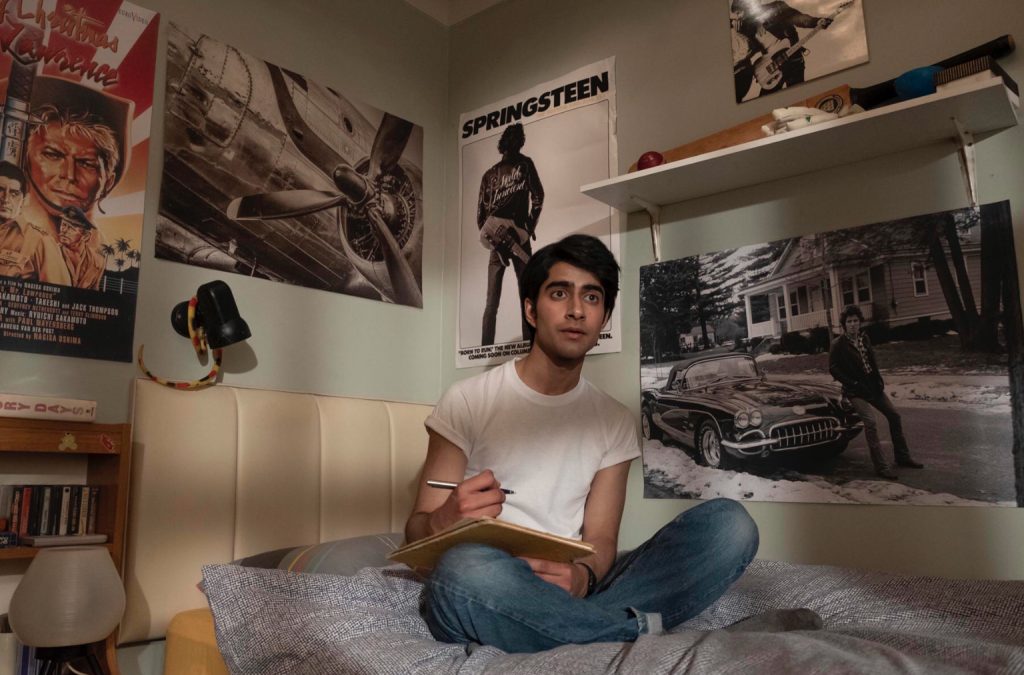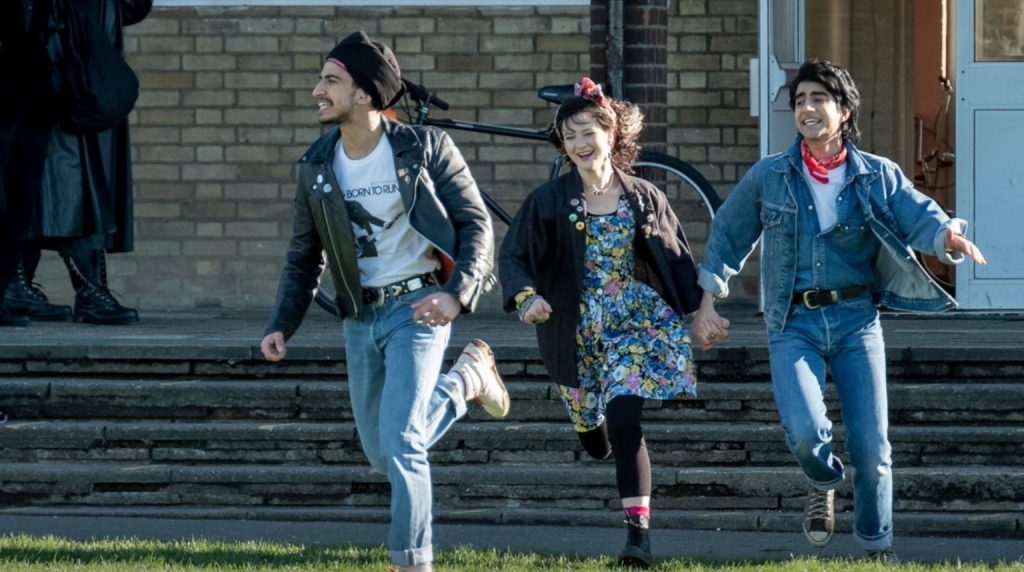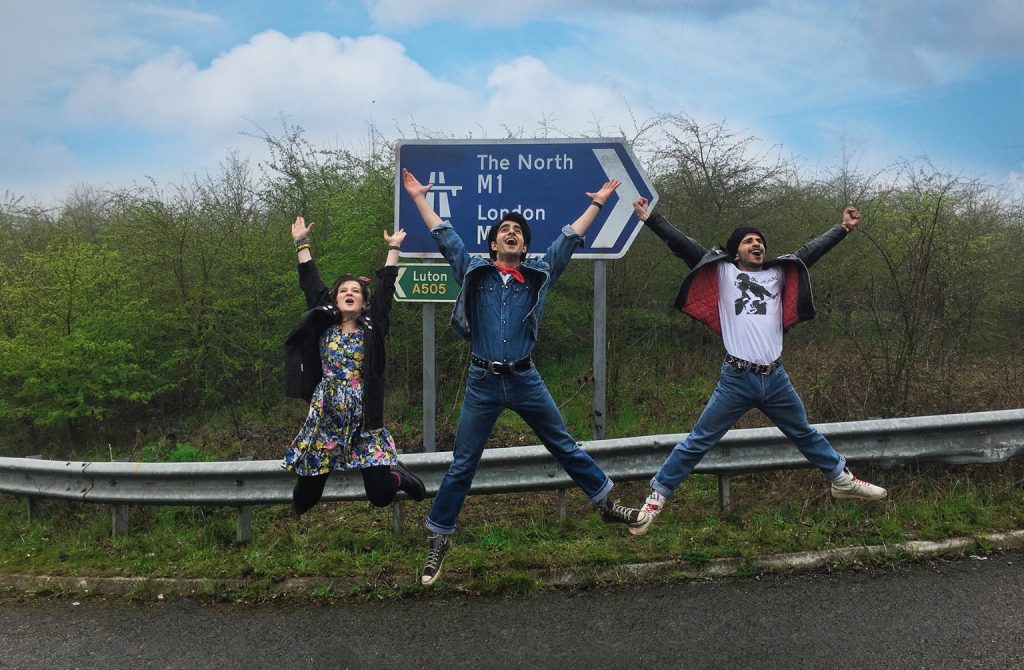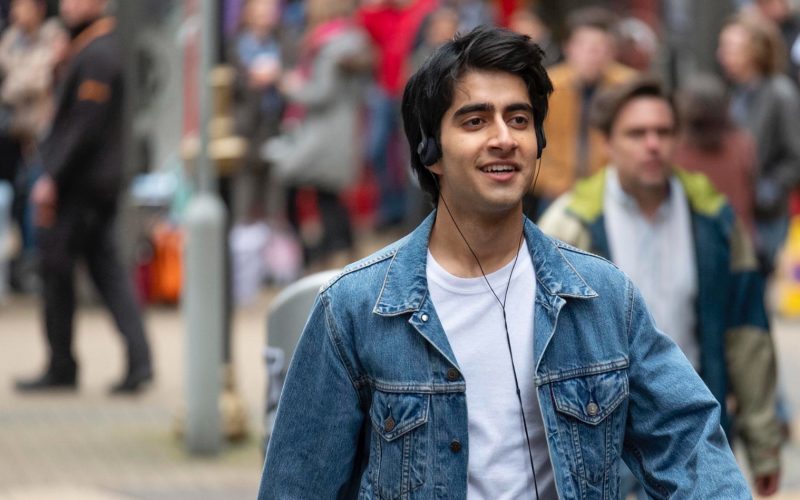Blinded By the Light (2019).
It was almost inevitable that I would become a Bruce Springsteen fan. My father’s family is Italian, from a town in New Jersey less than 50 miles from the Stone Pony, the Asbury Park music venue that famously served as a proving ground for the young, aspiring rock star (as well as many other acts). Then again, that inevitability, that connection to my father and his family might seem like Springsteen’s music would be something to rebel against once I came to find my own musical tastes, finding a home in heavy metal and dipping my toes in punk rock. Yet the hooks of Springsteen never left me. From early memories of finding his catchy anthems irresistible as a child, to being crushed by the brutally bleak storytelling of his Nebraska album while in college, to finally falling in love with his early output in my thirties, Springsteen has always been with me. As I follow and love the music he has created, and continues to create, since I found my own musical tastes, I keep him with me still.
That simultaneous inevitability and improbability of my own Bruce fandom makes the story of Blinded by the Light so easy to relate to for me, a white American, watching the story of a Pakistani teenager under the boot of racism, family obligation, and economic depressing in 1980s England. As with so much of great art, the music of Springsteen reaches across generations, cultures and continents; it is so personal it becomes universal. Springsteen has always trafficked in such wonderful contradictions. A champion of the working class, the everyman, he has acquired the nickname ‘The Boss,” all the while (by his own admission) never working a real job in his life. His songs are not of him, but of characters. But his love for those characters is one he takes very seriously, which is why his music reaches someone like Javed Khan.

When we meet Javed Khan, played by Viveik Kalra, he’s a lonely teenager looking for a way to get out of his small English town, to find a way to discover both himself and some meaning in the world. He could very well be the subject of a Springsteen song, and Kalra plays Khan with the youthful earnestness of a Springsteen character, staring off into the distance at the dreams, any dream, that might take him away from his loneliness. It is a testament to Kalra’s charisma as a performer that Blinded by the Light works as well as it does as so much of the film is focused (literally and figuratively) on Khan as he stares longingly just off-camera as he listens to Bruce belt-out his well-known anthems. We are with Khan when his friend Roops gives him a Springsteen cassette and, in a truly magical moment, he puts on his headphones and hears The Boss for the first time. His soul is emboldened and transformed, and the film makes its most dramatic break from literal reality as light and shadows dance across the physical surroundings of Javed’s home and home town. Lyrics are projected on walls and Javed’s face as the music and words give him a newfound purpose.
This sort of unabashed sentimentality is a hallmark of director Gurinder Chadha, whose best-known work is probably 2002’s Bend it Like Beckham, a charming movie to be sure, and one that covers many of the same themes of Blinded by the Light such as racism and pursuing one’s dreams despite societal and familial objections. However, seventeen years later, with xenophobia rampant on the world stage, a white nationalist in the White House and the Brexit fiasco in Great Britain, it seems quaint and naive in retrospect. Blinded by the Light is not that. It is England in the late 1980s, and economic hardship is everywhere, impacting immigrants and native-born English people alike. National Front marches prevent Muslims from attending Mosque and vandals spray paint obscenities and Swastikas on the homes of immigrants. This is a dark and dismal England, one that is still reflected in the desperation of Springsteen’s songs, many of which contain tales of class struggle, unemployment, abuse and racial violence. Like Bruce’s music, Blinded by the Light is able to balance that dismal reality with the pure, unreserved sentimentality of hope and vibrancy, of the yearning to be something greater than just where we came from. It might be too sweet and optimistic for some, but the film is 100% itself, unconcerned with naysayers who might scoff at characters triumphantly singing Springsteen lyrics to one another. It’s a refreshingly open way to make cultural commentary, one more concerned with vulnerable emotionality rather than clever (or even cogent) argument/counter-argument.

This dreaming of better things is impeded by Javed’s family, whose immigrant status makes them exceptionally vulnerable in these troubled economic times. As a response, Javed’s father doubles-down on his requirements of his family to be traditionally Pakistani (or at least his vision of it) and providing income. This inter-generational conflict is more realistically portrayed, more stark, and far more harrowing than director Chadha showed in Bend it Like Beckham. There is genuine, long-lasting pain here. Javed’s father (played with simultaneous infuriating authoritarianism and vulnerability by Kulvinder Ghir) is made dangerously insecure by his inability to financially provide for his family, and his response is to lash out at those around him. The pain of his past is visited upon his present, and it is a testament to his wife and his children that they are able to overcome that, to help him overcome it, and love him through all of it.
Through it all we see Javed fall deeper and deeper in love with Springsteen’s music and find deeper meaning and strength through it. His obsession with The Boss, reaches levels that only a teenager in the throes of hero worship can reach. It’s adorable and first, but the film is smart enough to know it can also be dangerous. His closed-mindedness to other types of music leads him into conflict with his childhood friend Matt, who has been supporting Javed with companionship and his own music for years. Javed must realize that other people have their own voice, and their own way of finding the beauty in that voice. He is able to journey to a punk show with his girlfriend, to a daytime dance club with his sister, and sees how these different people find their strength the same way he finds something special in him with the help of Bruce Springsteen. Indeed the film is at its most cinematically compelling as it sings and dances its way through the Springsteen catalogue, all the while acknowledging the other cultural forces driving through Britain in the late 1980s, many of whom (including Javed’s peers) see Bruce as a relic of the past. In this way Blinded by the Light is able to look at the 1980s in an honest way, not with rose-tinted glasses of nostalgia, nor with the upturned-nose of dismissive cynicism, but is able to acknowledge both the cultural dynamism of the time and the simultaneous hardship and racism, all encapsulated by the magic and honesty of Bruce Springsteen’s music.

Excellent supporting work is done by Rob Brydon (a Springsteen fan himself) in a small role as the father of Javed’s friend Matt, as well as Hayley Atwell, who plays Javed’s English teacher and provides some much needed encouragement. Meera Ganatra plays Javed’s mother with empathy and world-weary strength, and David Hayman plays the Khan family neighbor, who offers some unexpected wisdom to Javed when he is in dire need of it. Nell Williams is positively luminous, playing Javed’s girlfriend Eliza, singing and dancing her way with Javed, finding unexpected joy in The Boss’s music, even as she bounces from her conservative family to riotous punk venues.
Javed’s passion does, as the trailers have already given away, bring him to the States to visit the legendary hometown of Bruce Springsteen, and many of the locations that his own legend have immortalized. After having to climb so many walls put in front of him, it’s a triumph to see Javed bask in the joy of this experience, to share it with his friend Roops and for what it means for his future career as a writer. The film is after all based on the true story of journalist Sarfraz Manzoor, who found clarity and purpose in the music of Springsteen. I honestly cannot say if Blinded by the Light will do for non-Springsteen fans what it did for me, as the connection to that music to the viewer, through the real life of Manzoor and his analog Javed is essential to the experience as a whole. However, if you are a fan of The Boss I can’t recommend Blinded by the Light highly enough. Sure, it’s unabashed in its fandom, it openly expresses its love in a time when cynicism is taken for intelligence, but it is a movie about a dreamer finding himself through the art of another dreamer. And damn it, even as I write this, I want to jump in that dream again.
Film ‘89 Verdict – 8/10
Blinded by the Light is on general theatrical release now.

